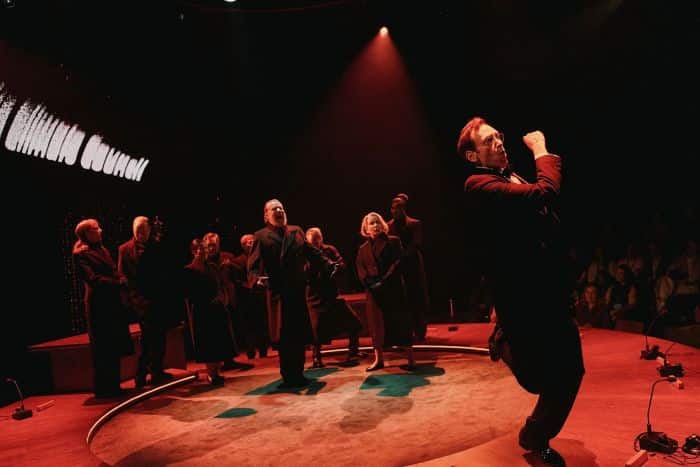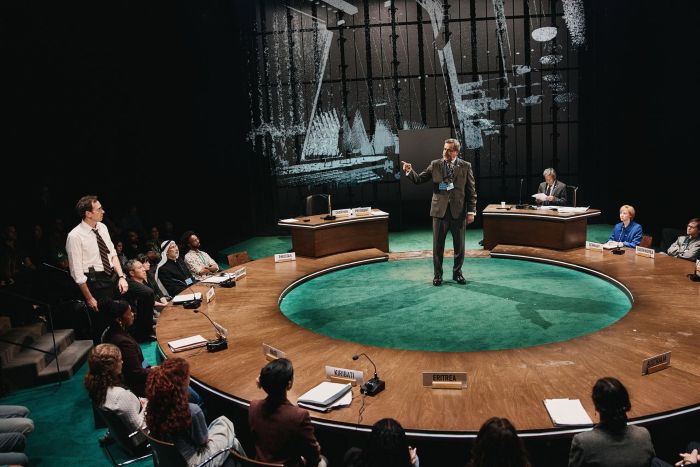On December 11, 1997, delegates from 170 countries met at Japan’s Kyoto Conference Center to negotiate the Kyoto Protocol, an agreement to lower the amount of greenhouse gases released into the atmosphere and the first major international effort to slow global climate change. The signing of the accord was a hard-won battle, with the nations deadlocked, time running out, and American lawyer and oil lobbyist Don Pearlman leading the resistance and providing the biggest obstacle to ecological progress. Commissioned by England’s Good Chance Theatre, written by its Artistic Directors and playwrights Joe Murphy and Joe Robertson, and presented by arrangement with the Royal Shakespeare Company, Kyoto is now playing a limited Off-Broadway premiere engagement at the Mitzi E. Newhouse Theater, following acclaimed sold-out productions in Stratford-upon-Avon and London’s West End.
 Stephen Kunken (right) and cast. Photo by Emilio Madrid.
Stephen Kunken (right) and cast. Photo by Emilio Madrid.
But the story doesn’t begin there in the titular city. Prior to the final conference in Japan, the delegates met at locations around the world for nearly a decade, and the play traces the origins of the highly contentious struggle back to 1989, through all the subsequent tension-filled meetings of the ‘90s, the behind-the-scenes lobbying and intrigue of Pearlman and his surreptitious collusion with the ‘Seven Sisters’ oil cartel (comprised of the companies later known as BP, Gulf, Shell, Chevron, Esso, Mobil, and Texaco), and the impact on his wife and their unseen son. It’s all recounted through the eyes of Pearlman in direct address to the audience and enacted by a stellar cast of fourteen, assuming the appropriate accents of their characters, speaking bits of their native languages (when one of the meetings runs late into the night and the translators leave at midnight), and delivering the heated debates, self-interests of their respective countries, and the ridiculous, petty, and counter-productive disputes over everything (including single words and punctuation marks), combining historic docu-drama with over-the-top absurdity.
Under the direction of Stephen Daldry and Justin Martin, the performance – set at a large round-table with chairs, a circular stage in the center, two podiums and a door at the far side, a full-scale projection screen on the back wall, and digital screens around the house (scenic design by Miriam Buether) – is fully immersive and interactive, with the cast actively moving around the set, the aisles, and the audience (some of whom are seated around the table with the cast, and all of us given delegate badges upon entering the theater), and repeatedly soliciting our support. They erupt in anger, yell and talk over each other, storm out, and even reach the breaking point with Pearlman, banning him from the floor. There are also quieter moments with his wife, who is longing to go on vacation with him, but instead travels with him to the conferences, is left alone for much of the time, and has growing questions about his involvement and loyalties (at one point he pretends to answer a call from his son, but is caught in his deception when the phone on which he is supposedly speaking to him rings again).
 Stephen Kunken, cast, and audience. Photo by Emilio Madrid.
Stephen Kunken, cast, and audience. Photo by Emilio Madrid.
Leading the gripping and animated cast is Tony nominee Stephen Kunken, reprising his acclaimed role from the British productions as the money- and ego-driven Pearlman, brilliantly capturing the moral bankruptcy and bravado of the self-important opportunist, willing to lie and deceive, polarize and discredit (challenging the validity of sound scientific data and destroying the life and career of potential Nobel Prize winner Dr. Ben Santer – well-played by Daniel Jenkins – who identified the fingerprint of climate change in the layers of the earth’s atmosphere) when it’s to his advantage, and to forsake any ethical judgments on behalf of the paramount cause for which the delegates were sent to negotiate.
Also reprising his Olivier Award-nominated role, Jorge Bosch, as Argentinian lawyer and conference leader Raúl Estrada-Oyuela, goes head-to-head with Pearlman, at first on friendly terms with him and his wife, subsequently revealing their backgrounds and motivations to one another, and ultimately making the power move to hold one final meeting after the deadline passed without a consensus, to resolve the decisions on which the delegates could not/would not agree, and to demand a unanimous passage and signing of the protocol, which the at-odds group at long last did, more out of exhaustion and unwillingness to admit defeat than any true sense of diplomacy, being “united nations,” or concern for the environment. And even though the US signed, it was not legally binding until ratified by the Senate, which it never was.
 Jorge Bosch (center) and cast. Photo by Emilio Madrid.
Jorge Bosch (center) and cast. Photo by Emilio Madrid.
Rounding out the roster of clashing characters are Jenkins, who, in addition to playing Santer, appears as Senator, then Vice President, Al Gore (who’s been at the forefront of the movement to solve the climate crisis), Swedish meteorologist Bert Bolin, and an anonymous Observer raising important questions; Peter Bradbury as climate change skeptic Fred Singer; and Natalie Gold as Pearlman’s wife Shirley, who is made increasingly aware of his position, begins to wonder if he is on “the right side,” and, in her closing direct-address monologue, admits to avoiding mention of him after his death. The changing scenes and tones throughout the searingly insightful and wildly sardonic thriller are triggered by dramatic shifts in lighting (by Aideen Malone), sound (by Christopher Reid), and original music (by Paul Englishby), with the many years and locales of the narrative set in video projections (by Akhila Krishnan) showing news clips of then current events, well-known politicos, and views of the international sites where the action took place.
For those interested in learning more about the ongoing danger of climate change (information known to the oil companies and suppressed by them since 1959) and the political machinations involved in the decades of international efforts to save our planet, Kyoto offers an entertaining and revealing deep dive into the subject, with a consistently engaging cast and immersive staging that brings all of us into this urgent universal issue.
Running Time: Approximately two hours and 30 minutes, including an intermission.

Kyoto plays through Sunday, November 30, 2025, at the Mitzi E. Newhouse Theater, Lincoln Center for the Performing Arts, 150 W 65th Street, NYC. For tickets (priced at $140.50-212.50, including fees), go online, or find discount tickets at TodayTix.


AloJapan.com